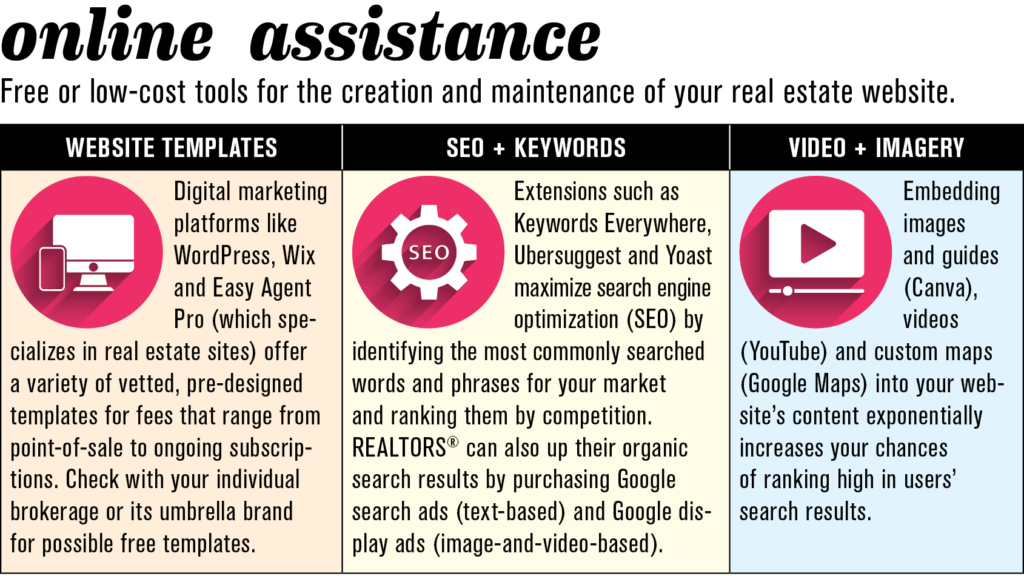Agents can harness the power of their websites to highlight local attractions and events, thereby attracting more clients
By Shaila Wunderlich
Since their rollout in the early 1990s, commercial websites have evolved.
They’ve gone from glorified business cards to sophisticated marketing tools, able to generate leads and target consumers before they are even aware of needing the service. “When it comes to marketing, the website is at the top of the funnel,” says Carolyn MacNeill, social media manager at Steve McKenna & The Home Advantage in Arlington, Massachusetts. “Whether through saved searches or people registering on the site, we provide useful information to engage potential customers and further connect with them through social media and other routes.”
Over the past five to ten years, real estate websites have found a tremendously effective niche by offering informative, hyper-local content that’s both free of charge and free of heavy-handed sales pitches.
Local content
Karin Carr, CRS, team owner at Real Broker in Savannah, Georgia, had a website for her brokerage in Atlanta, but it wasn’t until she and her husband moved to Savannah in 2017 that she realized the power of hyper-local content. “We followed my parents, who had recently retired there and loved it,” says Carr. “Right away I noticed all these other retirees around doing the same thing, and it occurred to me what an opportunity this was.”
For her new brokerage, Carr launched a customized website built around one main theme: relocating to Savannah. She used her own exploration of her new hometown as a chance to curate content for the site. “I was new to town and had nothing but time. I’d drive around different neighborhoods with my phone on a selfie-stick jutting out the sunroof, making videos of the surroundings.
“My personal opinion is people don’t need me for home searches—they go to Zillow or Redfin for that,” says Carr, a frequent speaker on the subject of real estate digital marketing. “When they go to Zillow, they see a beautiful photo taken by a photographer. They don’t see that there are no trees in the neighborhood. They don’t see that there’s a golf course, a pool and that it’s five minutes to the grocery store.”
Carr wrote blog posts and downloadable guides based on what she learned, and results followed in short order. “We get a ton of leads from our website—leads that turn into paying clients,” she says. “These aren’t just tire-kickers, either; they’re people who are ready and willing to complete a transaction sometime in the near future.”
The McKenna team saw similar results after partnering with real estate digital marketing experts Union Street Media to revamp their website in the spring of 2021. The redesign includes a “Greater Boston Communities” section featuring interactive maps searchable by neighborhood. In the 11 months following its launch, traffic increased by 40%. “People use our website as a resource,” MacNeill says. “Steve [McKenna] has been a REALTOR® in this region for more than 35 years; he’s an expert on the local amenities and neighborhoods. People are doing research on our site and then staying.”
Leverage the local
“Evergreen” content (timeless material) tends to perform better on real estate sites than does timely, topical content. Its one-and-done, set-it-and-forget-it nature also makes it easier to produce. “My oldest blog posts are the ones that bring me the most leads,” says Carr, who aims to post six to eight pieces of new content per year. “The longer it’s up on Google, the better it performs.”
Search engine optimization (SEO), keywords, imagery and video can leverage such content to attract online browsers and lead them back to a REALTOR®’s site (see sidebar below). “The goal of a good real estate website is to rank well in organic searches and get in front of potential buyers and sellers during the first three weeks of their thought process,” says Ted Adler, Union Street Media’s founder and president.
Online tools and apps help identify which keywords and search phrases potential buyers and sellers are most frequently using to search their markets. In Carr’s case, it was “retiring in Savannah,” “moving to Savannah” and related phrases. “People want to know what it costs to live there, what there is to do, whether there are hospitals and airports,” she says. “I’m a huge believer in SEO because it’s 100% free.”

Scaled-back sales
If local content is the top tool in a REALTOR®’s online arsenal, a low-key, soft-sales delivery takes a close second. “We’re very cognizant about not being pushy or salesy; we try to let people do their searches and come to us when they’re ready,” MacNeill says. “It’s a balance, and it’s intuitive. You have to identify who might want extra help versus those who are just perusing.”
Fundamental to that approach, according to Carr, is that a site’s useful, local content be offered free of charge. Carr’s gchluxurygroup.com features a menu of local guides, all of them available for free download in exchange for registering on the site. “They fill out a form in exchange for a free download or click a ‘contact me’ button for a free consultation,” says Carr, who averages one to three daily leads this way. “They’ve gotten all this information from me, so by the time I reach out to them, they feel like they know and can trust me.”
DIY versus hire-it-out
Of course, creating and maintaining an effective website requires a certain investment of time and money. A substantial amount of both goes toward upfront design and content creation, the rest to weekly/monthly maintenance and occasional refreshing (Union Street recommends every three to five years). The sum-total of both depends upon a business’ budget and bandwidth. Independent REALTORS® or smaller brokerages like Carr’s three-person team may opt to take on much of the work themselves, while larger firms with deeper pockets may partner with third-party specialists. Steve McKenna & The Home Advantage allocates around 32% of its marketing budget toward its website.
Carr employs a part-time virtual assistant for optimizing blog posts for SEO and relies on convertible templates from real estate digital platform brand Easy Agent Pro, for which she pays around $175 a month. “They say, ‘Choose your color scheme, send us your logo and we’ll take it from there,’” she says. “So they provide the framework, basically, and I handle the content.
“It can be time-consuming, yes. But a few hours’ worth of work for nearly 5,000 views—that’s worth the return in my opinion.”
Learn a step-by-step process for managing your online presence with the eLearning course Managing Your Online Presence, available at CRS.com.
Photo: iStock.com/iMrSquid/4×6/Rainer Lesniewski








